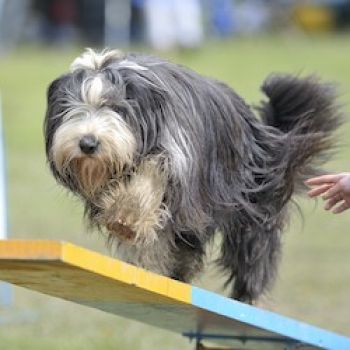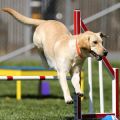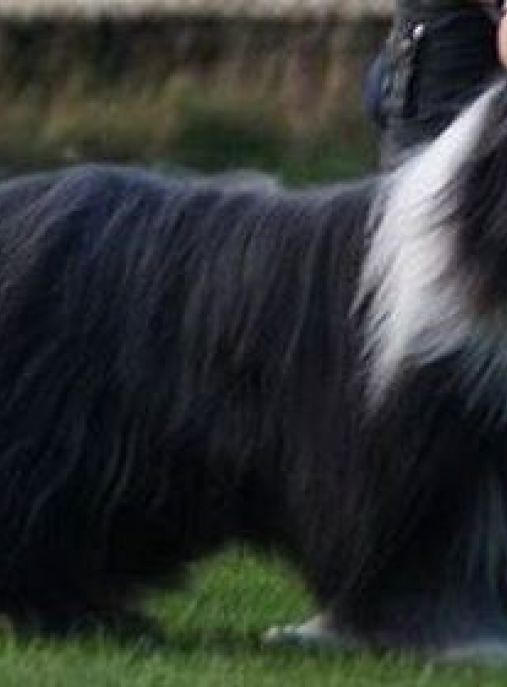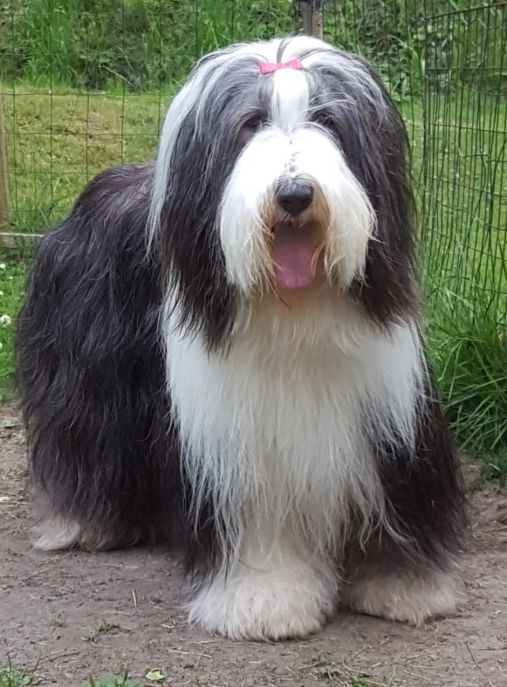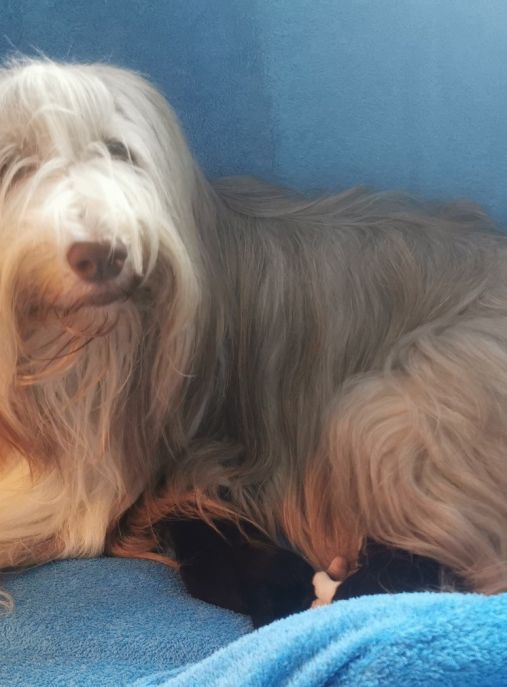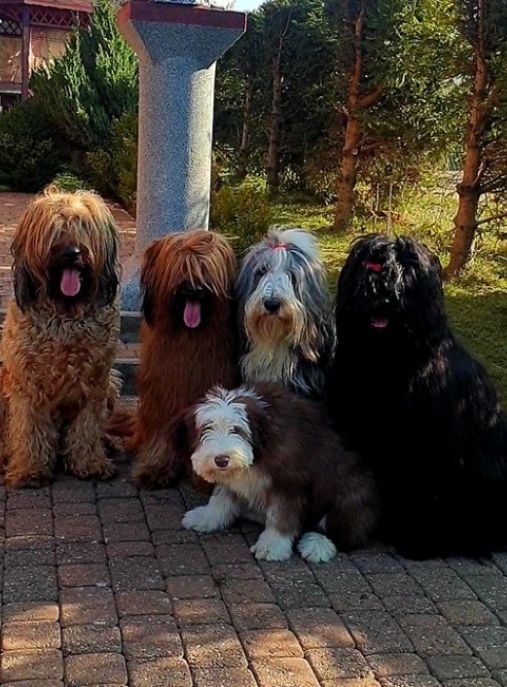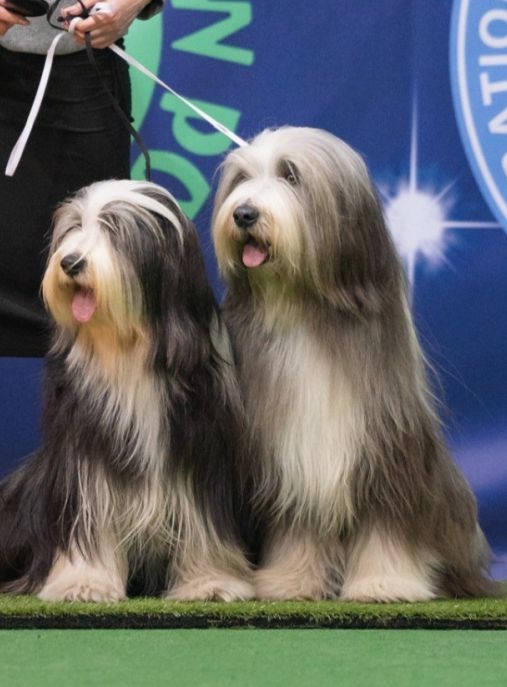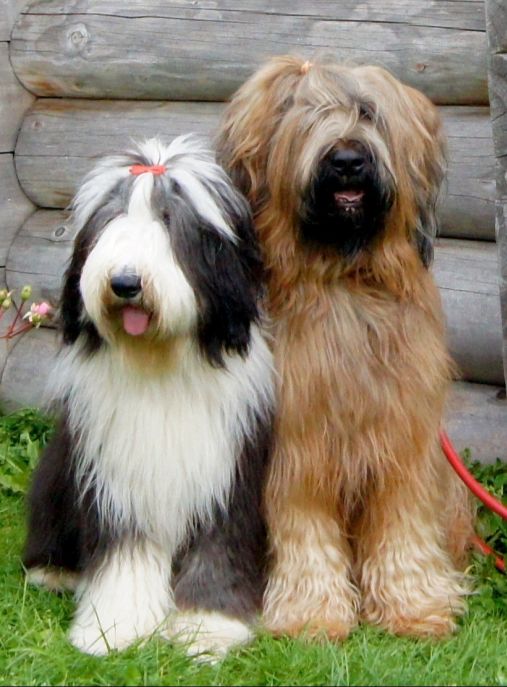The Bearded Collie, also known as the Beardie, is a medium-sized herding dog breed that is known for its shaggy coat and charismatic personality. With its distinctive appearance and playful nature, the Bearded Collie has become a beloved companion and working dog around the world.
Originating in Scotland, the Bearded Collie has a rich history that dates back several centuries. It is believed that the breed's ancestors were brought to Scotland by Polish traders in the 16th century. These dogs were then crossed with local herding breeds, resulting in the development of the Bearded Collie we know today.
According to the Fédération Cynologique Internationale (FCI) typology, the Bearded Collie belongs to Group 1: Sheepdogs and Cattle Dogs (except Swiss Cattle Dogs). Within this group, it is classified under Section 1: Sheepdogs. This classification highlights the breed's strong herding instincts and its ability to work with livestock.
Bearded Collies are versatile dogs that excel in various roles. Historically, they were primarily used as herding dogs, helping shepherds in Scotland move and manage their flocks. Their intelligence, agility, and stamina made them well-suited for this demanding task. Today, while still valued for their herding abilities, Bearded Collies are also popular as family pets, show dogs, and even therapy dogs.
In terms of physical characteristics, the Bearded Collie is a medium-sized dog with a sturdy build. Males typically stand between 20 to 22 inches (51 to 56 cm) at the shoulder, while females are slightly smaller, ranging from 19 to 21 inches (48 to 53 cm). The breed's weight ranges from 45 to 55 pounds (20 to 25 kg). These measurements contribute to their agility and ability to navigate rough terrains.
One of the most distinctive features of the Bearded Collie is its long, shaggy double coat. The outer coat is dense, weather-resistant, and straight or slightly wavy. The undercoat is soft and insulating, providing protection from harsh weather conditions. The coat comes in various colors, including black, brown, blue, and fawn, often with white markings. Regular grooming is essential to prevent matting and maintain the coat's health and appearance.
The Bearded Collie has a friendly and outgoing personality, making it an excellent companion for families. They are known for their love of play and their ability to get along well with children and other pets. However, their herding instincts may lead them to try and herd family members, especially small children, by nipping at their heels. Early socialization and training are crucial to ensure they channel their instincts appropriately.
With proper care and nutrition, Bearded Collies have a relatively long lifespan compared to other breeds of similar size. On average, they live between 12 to 14 years. Regular exercise is essential to keep them mentally and physically stimulated. Daily walks, playtime, and opportunities to engage in herding or other dog sports are recommended to keep them happy and healthy.
In addition to their herding abilities, Bearded Collies are known for their intelligence and trainability. They excel in obedience and agility competitions, and their problem-solving skills make them quick learners. However, they can also be independent thinkers, so consistent and positive reinforcement-based training methods work best with this breed.
Bearded Collies are generally healthy dogs, but like all breeds, they may be prone to certain health issues. Some common concerns include hip dysplasia, progressive retinal atrophy (PRA), hypothyroidism, and autoimmune diseases. Responsible breeders conduct health screenings and genetic testing to minimize the risk of these conditions in their breeding lines.
In conclusion, the Bearded Collie is a versatile and charismatic breed that has captured the hearts of dog lovers worldwide. With their striking appearance, intelligence, and friendly nature, they make excellent companions, working dogs, and show dogs. Whether herding sheep or playing with children, the Bearded Collie brings joy and enthusiasm to every aspect of their lives.
The Bearded Collie, also known as the Beardie, is a delightful and charismatic breed that possesses a unique character. With their shaggy coat, expressive eyes, and endearing smile, these dogs are not only visually appealing but also possess a charming personality that makes them a beloved choice for many dog enthusiasts.
One of the defining traits of the Bearded Collie is their friendly and outgoing nature. They are known for their sociability and love to be around people, making them excellent family pets. They thrive on human companionship and are always eager to please their owners. This breed is highly affectionate and forms strong bonds with their family members, including children and other pets.
Intelligence is another prominent characteristic of the Bearded Collie. They are quick learners and possess a keen sense of problem-solving. However, their intelligence can sometimes lead to a stubborn streak, making consistent and patient training essential. Positive reinforcement techniques, such as treats and praise, work wonders with this breed, as they respond well to rewards and encouragement.
Beardies have a natural herding instinct, which can manifest in their behavior. They may try to herd children, other pets, or even objects around the house. While this behavior is instinctual, it can be managed through proper training and redirection. Engaging them in activities that stimulate their minds, such as obedience training or agility courses, can help channel their energy and prevent boredom.
Exercise is crucial for the well-being of Bearded Collies. They are an active breed that requires regular physical activity to stay happy and healthy. Daily walks, playtime in a securely fenced yard, or participation in dog sports are all excellent ways to meet their exercise needs. Mental stimulation is equally important, as these dogs thrive on mental challenges and enjoy learning new tricks and commands.
Grooming a Bearded Collie can be a time-consuming task due to their long, double coat. Regular brushing is necessary to prevent matting and keep their fur clean and healthy. Additionally, they may require professional grooming every few months to maintain their coat's appearance. Their facial hair, which gives them their distinctive "beard," requires special attention to keep it clean and free from food debris.
When it comes to raising a Bearded Collie, early socialization is vital. Exposing them to various people, animals, and environments from a young age will help them develop into well-rounded and confident dogs. Additionally, providing them with consistent rules and boundaries will help prevent any behavioral issues from arising.
Overall, Bearded Collies are loving, intelligent, and active companions that bring joy to their families. With proper training, socialization, and care, they can thrive in various living situations, from families with children to individuals looking for a loyal and devoted companion. Their unique character and endearing nature make them a cherished breed among dog lovers worldwide.
The Bearded Collie, also known as the Beardie, is a charming and energetic breed that requires specific care to ensure their well-being and happiness. Here is an extensive description of the recommended care for Bearded Collie dogs, including tips on what to do and what not to do:
1. Grooming: Bearded Collies have a long, shaggy coat that requires regular grooming to prevent matting and keep it looking its best. Brush their coat at least two to three times a week to remove tangles and debris. Additionally, regular bathing every 6-8 weeks will help keep their coat clean and healthy.
2. Coat care: Bearded Collies have a double coat, consisting of a soft, dense undercoat and a longer, harsh outer coat. Avoid shaving or trimming their coat too short, as it provides protection from the elements. Instead, opt for regular trimming to maintain a neat appearance and prevent excessive matting.
3. Exercise: Bearded Collies are an active breed that thrives on physical activity. Provide them with daily exercise, including long walks, playtime in a securely fenced yard, or engaging in dog sports like agility or obedience training. Mental stimulation is equally important, so consider puzzle toys or interactive games to keep their minds sharp.
4. Socialization: Early and ongoing socialization is crucial for Bearded Collies. Introduce them to various people, animals, and environments from a young age to help them develop into well-rounded and confident dogs. This will also prevent them from becoming shy or fearful in unfamiliar situations.
5. Training: Bearded Collies are intelligent and eager to please, making them highly trainable. Use positive reinforcement techniques, such as treats and praise, to motivate them during training sessions. Consistency, patience, and firmness are key to shaping their behavior effectively.
6. Mental stimulation: Bearded Collies are known for their intelligence and can become bored easily. Provide them with mental stimulation through interactive toys, puzzle games, and obedience training. Engaging their minds will help prevent destructive behaviors and keep them happy.
7. Health care: Regular veterinary check-ups are essential to ensure the overall health of your Bearded Collie. Vaccinations, parasite prevention, dental care, and annual blood work are all important aspects of their healthcare routine. Additionally, be aware of breed-specific health issues such as hip dysplasia, hypothyroidism, and progressive retinal atrophy.
8. Diet and nutrition: Feed your Bearded Collie a high-quality, balanced diet that meets their nutritional needs. Consult with your veterinarian to determine the appropriate portion sizes and feeding frequency based on their age, weight, and activity level. Avoid overfeeding, as Bearded Collies are prone to weight gain, which can lead to health problems.
What not to do:
1. Do not leave your Bearded Collie alone for extended periods. They are social dogs and thrive on human companionship. Leaving them alone for too long can lead to separation anxiety and destructive behaviors.
2. Do not neglect their grooming needs. Regular brushing and coat care are essential to prevent matting and maintain a healthy coat.
3. Do not use harsh training methods or punishment. Bearded Collies respond best to positive reinforcement techniques and gentle guidance.
4. Do not skip regular exercise. Lack of physical activity can lead to obesity and behavioral issues in Bearded Collies.
5. Do not ignore their mental stimulation needs. Boredom can lead to destructive behaviors, so provide them with plenty of mental challenges and activities.
By following these tips and providing the recommended care, you can ensure that your Bearded Collie lives a happy, healthy, and fulfilling life.
The Bearded Collie, a delightful and charismatic breed, is known for its distinctive and eye-catching coat color. These dogs are commonly seen in a variety of colors, each possessing its own unique charm. However, the most common color seen in Bearded Collies is a stunning shade of gray.
The gray coat of a Bearded Collie is often described as a beautiful blend of various shades, ranging from a soft and light silver to a deep and rich charcoal. This coloration gives the dog an elegant and regal appearance, enhancing its overall appeal. The gray coat is typically seen in different intensities, with some dogs having a lighter hue while others possess a darker shade.
One of the remarkable aspects of the Bearded Collie's gray coat is its ability to reflect light. When the sun's rays hit the fur, it creates a mesmerizing play of shadows and highlights, adding depth and dimension to the dog's appearance. This effect further accentuates the natural beauty of the breed.
The texture of the Bearded Collie's gray coat is another noteworthy feature. It is often described as dense, thick, and weather-resistant. This texture not only provides protection against harsh weather conditions but also gives the dog a fluffy and voluminous appearance. The coat is composed of a double layer, with a soft and insulating undercoat and a longer, coarser outer coat that forms the characteristic "beard" around the face.
In addition to the primary gray color, Bearded Collies may also have patches or markings of other colors on their coat. These can include white, black, or brown markings, which further enhance the dog's visual appeal. These markings can be found on various parts of the body, such as the chest, paws, and tail, adding a touch of individuality to each dog.
It is important to note that the gray color in Bearded Collies can vary slightly from dog to dog. Some may have a more silvery appearance, while others may exhibit a bluish or purplish undertone. This subtle variation adds to the uniqueness of each dog and makes them even more captivating.
Overall, the common color of Bearded Collie dogs is a captivating shade of gray. This color, with its various intensities and stunning play of light, gives these dogs a distinctive and elegant appearance. Coupled with their dense and weather-resistant coat, the gray color adds to the breed's charm and allure, making them a true delight to behold.
The Bearded Collie, also known as the Beardie, is a medium-sized herding dog breed with a distinctive shaggy coat and an amiable personality. While generally a healthy breed, Bearded Collies are prone to certain health conditions that owners should be aware of. Proper care and regular veterinary check-ups are essential to ensure the overall well-being of these dogs.
One of the most common health issues seen in Bearded Collies is hip dysplasia. This condition occurs when the hip joint doesn't develop properly, leading to discomfort, pain, and eventually arthritis. Regular exercise, a balanced diet, and maintaining a healthy weight can help reduce the risk of hip dysplasia. Responsible breeders often screen their breeding dogs for this condition to minimize its occurrence in the breed.
Another health concern in Bearded Collies is hypothyroidism. This condition arises when the thyroid gland doesn't produce enough hormones, leading to a range of symptoms such as weight gain, lethargy, hair loss, and skin problems. Regular blood tests can help diagnose and manage hypothyroidism, and affected dogs can be treated with synthetic thyroid hormone medication.
Bearded Collies are also prone to certain eye conditions, including progressive retinal atrophy (PRA) and cataracts. PRA is a degenerative disease that leads to gradual vision loss and eventual blindness. Regular eye examinations by a veterinary ophthalmologist can help detect PRA early on. Cataracts, on the other hand, cause clouding of the lens, leading to impaired vision. Surgical removal of cataracts may be necessary in severe cases.
Additionally, Bearded Collies can be susceptible to autoimmune diseases, such as autoimmune hemolytic anemia (AIHA) and autoimmune thyroiditis. AIHA occurs when the immune system mistakenly attacks and destroys red blood cells, leading to anemia. Autoimmune thyroiditis affects the thyroid gland and can cause hormonal imbalances. These conditions require prompt veterinary attention and may require lifelong management with medication.
To maintain the overall health of Bearded Collies, regular grooming is essential. Their long, double coat requires brushing several times a week to prevent matting and to keep the skin healthy. Regular bathing, nail trimming, and ear cleaning are also important aspects of grooming. Additionally, dental care is crucial to prevent periodontal disease, so regular teeth brushing and professional dental cleanings are recommended.
Exercise is another vital aspect of Bearded Collie care. These dogs have a high energy level and require daily physical and mental stimulation. Regular walks, playtime, and training sessions are necessary to keep them happy and prevent behavioral issues that may arise from boredom.
Proper nutrition is crucial for the health of Bearded Collies. A balanced diet that meets their nutritional needs, including high-quality protein, healthy fats, and essential vitamins and minerals, is essential. Avoid overfeeding to prevent obesity, which can lead to various health problems.
Regular veterinary check-ups are crucial to monitor the overall health of Bearded Collies. Vaccinations, parasite prevention, and routine blood work are important aspects of preventive care. Early detection and treatment of any health issues can significantly improve the prognosis and quality of life for these dogs.
In conclusion, while Bearded Collies are generally a healthy breed, they are prone to certain health conditions such as hip dysplasia, hypothyroidism, eye diseases, and autoimmune disorders. Responsible breeding practices, regular veterinary care, proper grooming, exercise, and a balanced diet are essential for maintaining the health and well-being of Bearded Collies.
The Bearded Collie is a beautiful and energetic breed known for its shaggy coat and playful nature. To ensure their overall health and well-being, it is crucial to provide them with a balanced and nutritious diet. Proper nutrition plays a vital role in maintaining their energy levels, promoting a healthy coat, and supporting their overall growth and development.
When it comes to feeding a Bearded Collie, it is essential to choose high-quality dog food that meets their specific nutritional needs. Look for a dog food that contains real meat as the primary ingredient, such as chicken, beef, or fish. Avoid foods that list fillers, by-products, or artificial additives as these can be detrimental to their health.
A balanced diet for a Bearded Collie should consist of a combination of proteins, carbohydrates, fats, vitamins, and minerals. Proteins are essential for muscle development and repair, so ensure that the dog food you choose contains a sufficient amount of high-quality protein. Carbohydrates provide energy, and whole grains like brown rice or oats are excellent sources. Fats are necessary for healthy skin and coat, so look for foods that contain healthy fats like omega-3 and omega-6 fatty acids.
It is important to feed your Bearded Collie the appropriate amount of food based on their age, weight, and activity level. Puppies require more frequent meals, usually three to four times a day, while adult Bearded Collies can be fed twice a day. However, it is always best to consult with your veterinarian to determine the exact feeding schedule and portion sizes for your specific dog.
In addition to commercial dog food, you can also include fresh, whole foods in your Bearded Collie's diet. Lean meats like chicken or turkey, cooked eggs, fruits, and vegetables can be added as occasional treats or mixed with their regular food. However, it is important to avoid feeding them foods that are toxic to dogs, such as chocolate, grapes, onions, garlic, and avocados.
Proper hydration is also crucial for a Bearded Collie's health. Always ensure that fresh, clean water is readily available for them to drink throughout the day.
While a healthy diet is essential, exercise is equally important for a Bearded Collie's overall well-being. Regular exercise helps maintain a healthy weight, promotes muscle development, and keeps them mentally stimulated. Engage in activities like daily walks, playtime, and interactive games to keep your Bearded Collie physically and mentally active.
Lastly, it is important to monitor your Bearded Collie's weight and body condition regularly. Obesity can lead to various health issues, so if you notice your dog gaining or losing weight, consult with your veterinarian to adjust their diet accordingly.
In conclusion, providing a Bearded Collie with a balanced and nutritious diet is crucial for their overall health and well-being. Choose high-quality dog food, feed them the appropriate portion sizes, and include occasional fresh, whole foods. Avoid toxic foods and ensure they have access to fresh water at all times. Regular exercise and monitoring their weight are also essential for maintaining their health. By following these guidelines, you can help your Bearded Collie live a long, healthy, and happy life.

